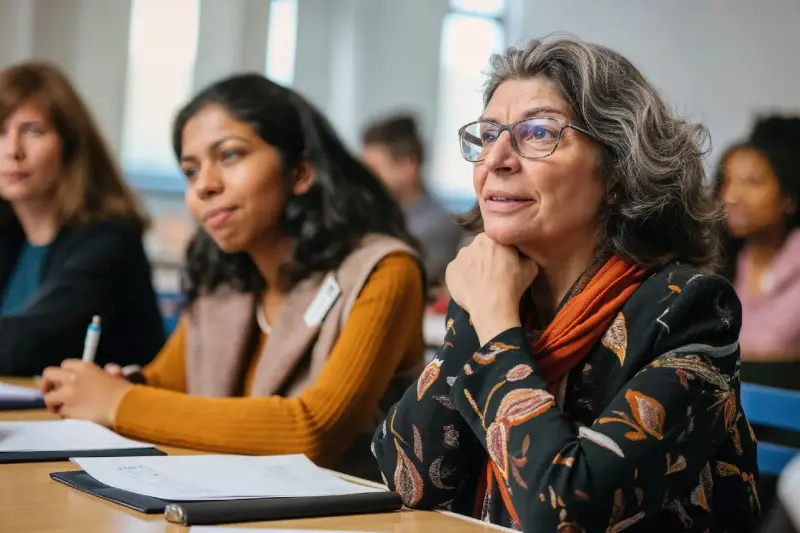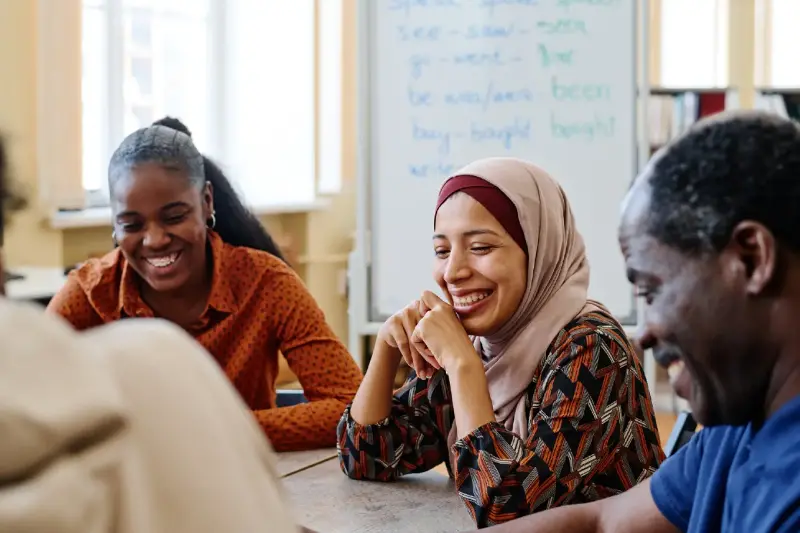There was a time when education was singularly viewed as the golden ticket handed out in one’s youth—a neatly framed degree, a diploma, or a certificate signaling the definitive end of an era of learning. Fast forward to today, and the very rules of the game have shifted dramatically. Lifelong learning and ongoing education are no longer mere buzzwords reserved exclusively for distant visionaries and cloistered academics. Instead, they are fundamentally reshaping the entire landscape of what it truly means to build unwavering confidence, adapt seamlessly, and not just survive but genuinely thrive in an increasingly unpredictable future.

The Science Of Staying Curious
Curiosity, that inherent, vibrant spark which relentlessly propels children to incessantly ask "why" at every conceivable turn, never genuinely disappears. Science unequivocally demonstrates that maintaining an actively inquisitive mind well into adulthood profoundly impacts both our cognitive health and our emotional well-being. Engaging in regular, stimulating learning activities significantly increases the brain’s remarkable ability to forge new neural pathways, effectively fend off age-related cognitive decline, and generously generate dopamine—the crucial neurochemical responsible for instilling feelings of motivation and profound reward.
But beyond the intricate workings of the brain, a cultivated curiosity powerfully paves the way for substantial social and professional growth. A pivotal 2021 report by the World Economic Forum compellingly found that problem-solving, critical thinking, and adaptability—all essential skills inherently nurtured by ongoing education—now rank among the absolute top proficiencies employers ardently seek in today's dynamic workforce. For both men and women keenly intent on remaining relevant and impactful, curiosity serves as the gentle, yet insistent, nudge to enthusiastically enroll in a new course, attend an insightful webinar, or simply pick up a compelling book on a previously unfamiliar topic.
Breaking The Myth Of Age Limits
Contrary to persistent and outdated myths, learning is emphatically not a privilege exclusively reserved for the young. In fact, adults of all ages are returning to educational pursuits in unprecedented and inspiring numbers. The venerable Open University in the UK, for instance, proudly reports active students well into their seventies and even eighties bravely tackling subjects ranging from complex psychology to cutting-edge coding. Crucially, modern technology has democratized access, making it easier than ever before to access world-class educational resources regardless of one's age or prior formal experience.
Research further reveals powerful and undeniable psychological benefits for adult learners. Actively pursuing education later in life has been consistently shown to reduce pervasive feelings of isolation, significantly improve self-esteem, and organically create invaluable opportunities for forging new social connections. The often-repeated phrase “it’s never too late” is no longer merely a cliché; it has become a scientifically proven pathway to profound personal growth and a brighter, more secure, and intellectually vibrant future.

Confidence—Education’s Silent Gift
Confidence does not miraculously emerge overnight; it is meticulously built, brick by painstaking brick, through a continuous process of accomplishment and overcoming challenges. Lifelong learning offers an almost endless stream of opportunities for this fundamental growth. Each new skill diligently mastered, from the daunting art of public speaking to the intricate nuances of digital literacy, delivers a profound sense of achievement that transcends the mere acquisition of a piece of paper.
A remarkable study conducted by the esteemed Institute for Employment Studies powerfully demonstrated that workers who consistently engaged in regular educational activities were significantly more likely to confidently seek promotions, boldly embark on new entrepreneurial ventures, or fearlessly transition into entirely different industries. The very act of learning, in its essence, subtly transforms vulnerability into robust capability, gradually eroding self-doubt and instilling a resilient mindset that is inherently ready for change. Confidence, it turns out, is far less about outward bravado and infinitely more about the quiet, inner certainty that you possess the inherent capacity to adapt, no matter what tomorrow unexpectedly brings.
The Evolving Workplace: Adapt Or Be Left Behind
Today’s workplace is a stark departure from the predictable, often linear career trajectories of previous generations. The relentless march of automation, pervasive digital disruption, and the ever-accelerating pace of technological change collectively demand agility and continuous learning above all else. The shelf life of a specific skill is rapidly shrinking—recent LinkedIn research pointedly suggests that many technical skills can become obsolete within as little as five years, while invaluable soft skills like resilience, critical thinking, and creativity grow ever more valuable and sought-after.
For both men and women aspiring to lead, to innovate, or simply to remain securely employed in their chosen professions, ongoing education serves as a vital and indispensable shield against uncertainty. Upskilling (the process of acquiring new, relevant skills for a current job role) and reskilling (the comprehensive learning of entirely new abilities for a different role or industry) have rapidly become mainstream and essential career moves. Companies around the globe, from tech giants like Google to agile local businesses, now proactively offer generous “learning stipends” and develop sophisticated in-house academies, recognizing that confident, continually learning employees are the true engines that drive sustained business success and innovation.

Personal Fulfilment Beyond The Paycheque
There’s an undeniable and significant dimension to education that extends far beyond mere employability or economic gain. Studies from the esteemed University College London have definitively demonstrated that adults who actively and consistently pursue learning are statistically happier, report significantly lower levels of chronic stress, and enjoy markedly better overall health outcomes. Learning inherently unlocks dormant passions, beautifully reconnects individuals with long-forgotten dreams, and courageously inspires projects that might never have seemed remotely possible before.
Consider the inspiring narrative of Sophia, who at the age of 48, made the bold decision to pursue ceramic artistry, diligently enrolling in evening classes while simultaneously juggling the demands of her full-time job and family responsibilities. What initially began as the acquisition of a practical skill soon organically blossomed into a thriving online shop, her newfound confidence profoundly fueled by ongoing mentoring and continuous learning. Or reflect on the journey of James, who, following redundancy at 55, courageously retrained in digital marketing and successfully landed a coveted consultancy role within six months, unequivocally attributing his triumphant journey to maintaining an open mind and an unwavering commitment to lifelong education.
Building Your Lifelong Learning Toolkit
So, in this vast landscape of opportunity, where does one even begin? The available resources are seemingly boundless—Massive Open Online Courses (MOOCs) from top universities, comprehensive university e-learning portals, engaging community workshops, and specialized industry certifications abound in rich supply. Many of these options are remarkably flexible, highly affordable, and thoughtfully designed to accommodate the complex realities of adult life. Podcasts, virtual conferences, and concise short masterclasses offer bite-sized, incredibly accessible options for even the most packed and demanding schedules.
Crucially, it is vital to remember that learning is emphatically not confined solely to formal educational settings. Reading widely across diverse genres, actively joining stimulating book clubs, passionately volunteering for a cause you deeply believe in, or embarking on the challenging yet rewarding journey of picking up a new language are all incredibly powerful and effective ways to continuously stimulate curiosity and cultivate unwavering confidence. The most successful lifelong learners are those who inherently embrace a growth mindset: a fundamental belief that intelligence and ability are not fixed, immutable traits but can, in fact, be continuously developed, expanded, and refined over time with sustained effort and genuine enthusiasm.
In an era fundamentally defined by constant disruption and rapid transformation, lifelong learning is no longer just a "nice-to-have" addition to one's resume but has evolved into an essential, non-negotiable life strategy. It is curiosity that gracefully opens the initial door, and it is unwavering confidence that courageously walks through it—again and again, with every new lesson mastered and every fresh challenge faced. Whether your ultimate goal is unparalleled career success, profound personal fulfillment, or simply the cultivation of sharper, more agile thinking, embracing ongoing education truly holds the transformative power to shape your future in the most extraordinary and unexpected ways.
